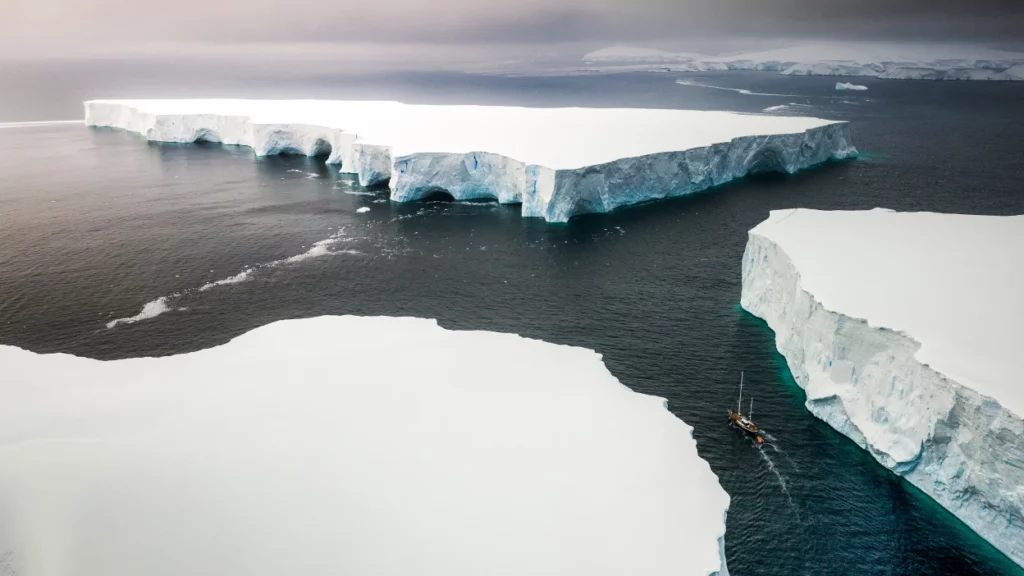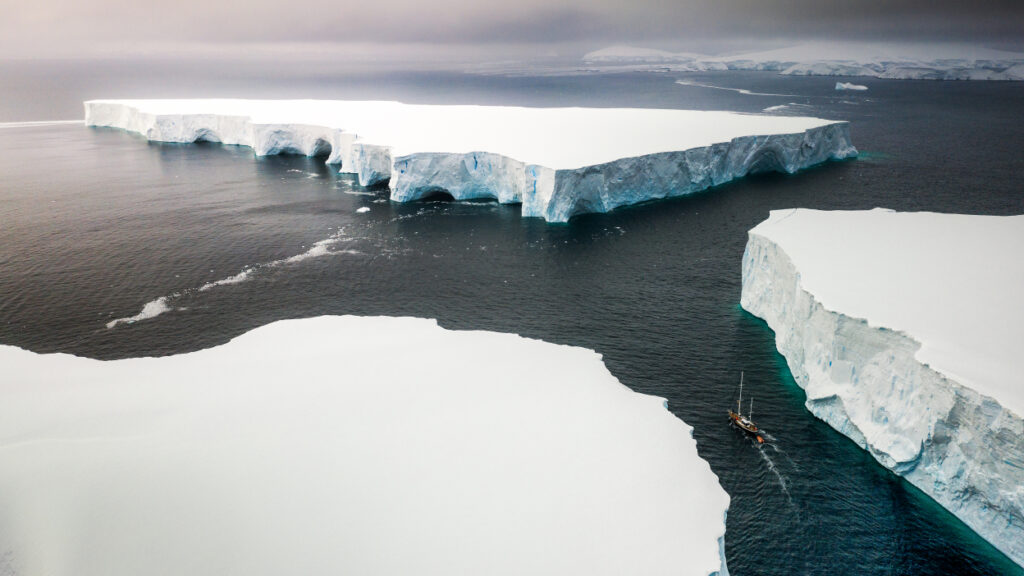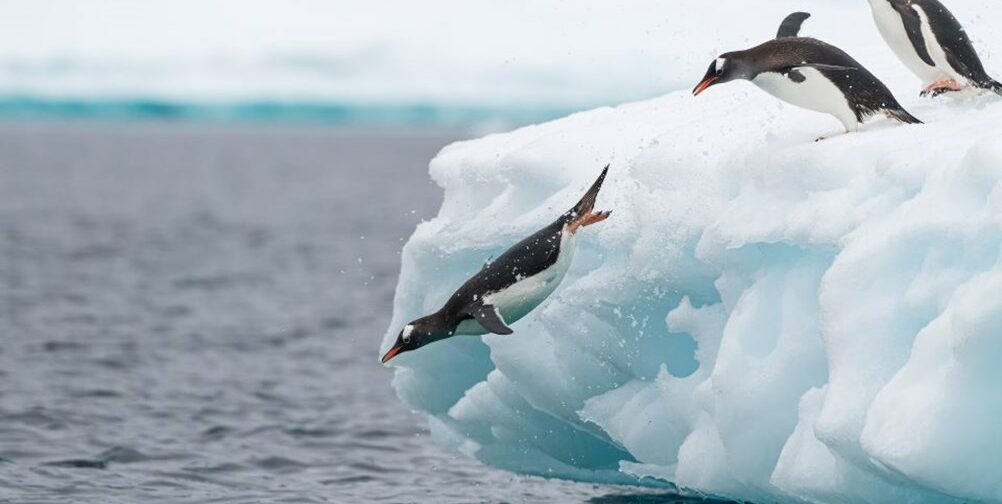The Thwaites “Doomsday” glacier is stretching out its death scene, and ours, in ways that would embarrass a 19th-century opera company. But according to a new study it will all be over soon as: “one theory suggests the glacier could soon begin to collapse into the ocean like a row of dominoes.” Unless it’s not: another study says “Antarctica’s ‘Doomsday Glacier’ Isn’t as Vulnerable to Collapse as We Thought”. Can’t get enough of that settled science.
The first story is actually a weird bait, switch and switch from The Conversation via Inverse. It continues by caroming from panic to reassurance and back:
“But is that kind of rapid collapse really as likely as feared? A new study of Thwaites Glacier’s susceptibility to what’s known as marine ice cliff instability offers some hope. But the findings don’t mean Thwaites is stable.”
No. They mean climate is so incredibly complex that even the behaviour of one part of one glacier baffles those who really are experts on it and study it for a living, offering continual surprises whose meaning escapes them. For instance Mathieu Morlighem, “who led the study” and who then writes in Inverse that:
“What we are seeing with Thwaites Glacier right now is a disaster in slow motion. The bedrock under Thwaites Glacier sits below sea level and slopes downward going inland, so the glacier gets deeper toward the interior of the ice sheet. Once the glacier begins losing more ice than it gains from new snowfall and starts to retreat, it’s very hard to slow it down because of this slope. And Thwaites is already retreating at an accelerating rate as the climate warms.”
So far so bad. But it gets worse, predictably:
“Thwaites Glacier holds enough ice to raise global sea level by more than 2 feet (0.65 meters). Once Thwaites starts to destabilize, it also will destabilize neighboring glaciers. So, what happens to Thwaites affects all of the West Antarctic Ice Sheet, and that affects sea-level rise along coastlines everywhere. Marine ice cliff instability is a relatively new concept proposed by scientists in the past decade.”
Oh. Ingenious. But not, um, a well-established phenomenon backed by masses of empirical evidence? More a trendy hypothesis to sustain the disaster-without-disaster disaster warnings? Yup:
“If Thwaites’ ice shelf were to collapse, it would expose a very tall ice cliff facing the ocean along its 75-mile (120-kilometer) front. There is only so much force that ice can sustain, so if the cliff is too tall, it will collapse into the ocean. Once that happens, a new ice cliff farther back would be exposed, and the new cliff would be even taller because it is farther inland. The theory of marine ice cliff instability suggests that if the cliffs collapse quickly enough, there could be a domino effect of ever-higher ice cliffs collapsing one after the other. However, no one has observed marine ice cliff instability in action. We don’t know if it will happen because a lot depends on how quickly the ice collapses.”
No one has observed it in action. So here it comes, unless it doesn’t.
The second story, somewhat unexpectedly, is from Scientific American which, as we’ve mentioned, cannot now apparently send out an email without something related to climate change, which really has sucked all the oxygen or CO2 out of the room for a lot of people. And it says “Antarctica’s riskiest glacier is a disaster in slow motion. But in a rare bit of good news, the worst-case scenario for its collapse may be off the table”. Phew. Unless it’s not.
You see:
“We found that Thwaites would remain fairly stable at least through 2100. We also simulated an ice shelf collapse in 50 years, when the glacier’s grounding line — where its grounded ice meets the ocean — would have retreated deeper inland. Even then, we found that marine ice cliff instability alone would not cause a rapid retreat.”
Still, you know how it goes:
“Antarctica can seem like a faraway place, but human activities that warm the planet – such as burning fossil fuels – are having dramatic effects at the poles. Ice loss contributes to sea-level rise, affecting coastal regions around the world. People’s choices today will determine how quickly the water rises.”
Now here’s the really good bit. They’re actually the same story. Word for word, in two different publications. And the bottom line is that while the worst that might happen, which we were assured would happen, might not happen unless it does, something else could happen unless it doesn’t that might be just as bad unless it’s not, never having been seen in action.
Stay doomed.



I wonder if these people are aware that no actual people are listening to them anymore, you only get so many Chicken Little alarms before your credibility is kaput! The only reason their credibility has lasted this long is because computer models spew out lots of nifty charts that seem to be the results of actual scientific investigation but in fact are just phony evidence based on dysfunctional computer models!
Broken record time:still even more uncertainty about the uncertainty!
A new theory, literally no supporting evidence, is promulgated that purports that sea level rise will be terrible sometime in the next 100-150 years; but it might not happen. And a 2 foot rise in that length of time is imminently adaptable so shooting down the need to do anything at all. And a theory, with no supporting evidence, is really beneath (un)Scientific American.
It seems like the vast majority of academic research is of the variety that is premised on the hypothesis that everything that an overpopulated humanity does above the level of a "sustainable" hunter-gatherer subsistence is destroying the planet. This phenomenon also tends to short cut the scientific method from a reinforced, rather than attempted disproving of an hypothesis, strait to advocacy of mitigation. It's also the justifying basis for the green theocracy that has essentially replaced democracy in the west putting us on the road to collectivist dystopian feudalism. I think its well past time to defund it.
If it’s word for word in two different publications then it can only be from the Coveringclimatenow.org star chamber. In honor of all this BS we watched The Day After Tomorrow a couple nights ago, where the initial victim was Larsen B. Now it’s all Thwaites, why doesn’t Larsen B get any love??
I feel sure that the majority of thinking humans on this planet are sick to death of the climate fear porn presented by scientists, who, if they were medical doctors would have long ago been branded “quacks” and properly censured by real scientists!
[…] See more here climatediscussionnexus.com […]